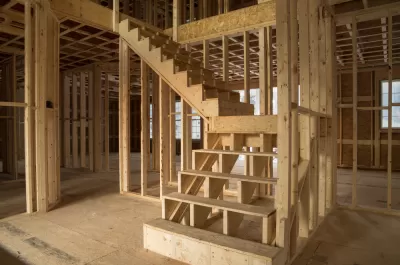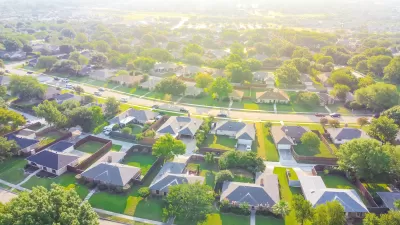There are lots of arguments available for people that want to oppose new housing projects, but what are a few guiding principles for framing a supportive and constructive housing conversation?

Anna Fahey presents the work of FrameWorks Institute in creating a blueprint for better messaging regarding housing.
FrameWorks Institute created the messaging recommendations for non-profit affordable housing developer Enterprise Community Partners, identifying six ways housing messages can backfire, and identifying ten ways to constructively reframe the conversation.
The list of messages "built to backfire" is a collection of "default patterns of thinking that hinder understanding of and support for affordability solutions." These are the arguments like "not in my backyard" and "crisis and fatalism" that will be familiar to anyone who has ever heard an argument opposing new housing, plus a few more perhaps new ways of looking at the why and how of housing opposition forces.
The ten ideas for a more constructive housing conversation includes recommendations like positioning people in stories about places and systems, stressing the connections between where we live and how we live, and focusing on positive change while acknowledging a history of inequality.
The article also includes a link to download a flashcard for easy reference of these ten guiding principles for positive and constructive housing messaging.
FULL STORY: A Blueprint for Better Housing Messages

Planetizen Federal Action Tracker
A weekly monitor of how Trump’s orders and actions are impacting planners and planning in America.

Maui's Vacation Rental Debate Turns Ugly
Verbal attacks, misinformation campaigns and fistfights plague a high-stakes debate to convert thousands of vacation rentals into long-term housing.

Restaurant Patios Were a Pandemic Win — Why Were They so Hard to Keep?
Social distancing requirements and changes in travel patterns prompted cities to pilot new uses for street and sidewalk space. Then it got complicated.

In California Battle of Housing vs. Environment, Housing Just Won
A new state law significantly limits the power of CEQA, an environmental review law that served as a powerful tool for blocking new development.

Boulder Eliminates Parking Minimums Citywide
Officials estimate the cost of building a single underground parking space at up to $100,000.

Orange County, Florida Adopts Largest US “Sprawl Repair” Code
The ‘Orange Code’ seeks to rectify decades of sprawl-inducing, car-oriented development.
Urban Design for Planners 1: Software Tools
This six-course series explores essential urban design concepts using open source software and equips planners with the tools they need to participate fully in the urban design process.
Planning for Universal Design
Learn the tools for implementing Universal Design in planning regulations.
Heyer Gruel & Associates PA
JM Goldson LLC
Custer County Colorado
City of Camden Redevelopment Agency
City of Astoria
Transportation Research & Education Center (TREC) at Portland State University
Jefferson Parish Government
Camden Redevelopment Agency
City of Claremont





























